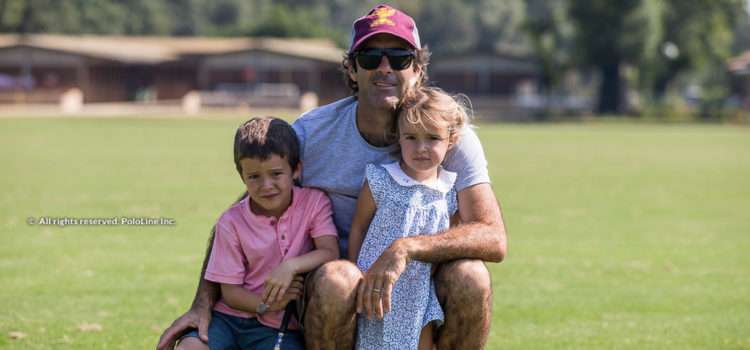Juan Martin Nero, recent champion of the high goal Silver Cup for a second consecutive season, is in the midst of a great year. The thirty-seven year old, who has maintained a perfect 10-goal handicap for the last ten years, not only won the title in Sotogrande, but qualified for the prestigious Gold Cup final in England. The year, however, has not been without its low moments. “Obviously replacing Falta and Chicha from one year to the next is impossible, but I continue investing in horses trying to improve,” shares Nero, referring to Falta Nut and Oli Chicha, two of his best horses that have shone in the Argentine Open over the years. Unfortunately, this year he won’t have them in the Triple Crown. His string, however, is still one of the most competitive in the world.
With just a month left until his 2018 debut in the Argentine Season, which kicks off for him with the Jockey Open, the legendary back talks over his season with La Bamba in the English high goal: “It was a great first year and we had a fun season. The organisation with Jean Francois (Decaux), the people, everything was impecable and we had a good time. They invited Pelon to play, he asked me to join, and that’s how the team came together. We made it to the semifinals of the Queen’s Cup and the final of the Gold Cup. Obviously we are still disappointed that we couldn’t win, especially considering how things were going into the last chukka. It was really a shame that Pelon injured his elbow, but we were lucky to have Polito, who played very well. We have a bit of a bitter taste in our mouths about losing the final, but it was a positive season overall. Next year Pelon and I will be back playing for La Bamba, so that will be fun.”
Looking forward, Nero has a new challenge on the horizon. After nine years playing with Lechuza, the organisation belonging to Victor Vargas, either in the US, Dominican Republic, or Sotogrande, the Trenque Lauquen local will be joining a new organisation. “I don’t know whether it will be my last year playing with Victor, because he still wants to play in Sotogrande,” tells Nero. “But after nine years of playing two seasons together, in the US – or Dominican Republic, as it has been for the last three seasons – and Sotogrande, it will be a big change to play with the Ganzi’s in the States. I am going to miss it because we spent some amazing years together, the organisation is incredible and I have been playing there for a long time. It was almost like home to me.”
For a second consecutive year, Adolfo Cambiaso is not playing the season in Sotogrande, and a few weeks ago the 10-goaler announced that he will not be playing the 2019 English season, either. “Not having to play against him is great!” laughs Nero, who has been playing in La Dolfina with Cambiaso since 2011. “It is always nice having him around, because that means that there is a competitive, well organised team in the tournament, which, at the same time, is what we all want. We always spend a lot of time together during the season, but he is now in a different stage in his career, and he is going to play with Bob in the States all year round. We are going to miss him.”
This year La Dolfina will go for another milestone, one that has not been reached by a polo team since 1979: becoming six time champions of the Argentine Open consecutively. Nero, however, is keeping his cool. “Having won the Open five times in a row does not change anything,” he says. “We always say the same thing: ‘We are champions until the year ends, then a new year starts and there is no champion.’ You need to gather that drive and hunger that makes you win. When the season starts, as always happens, you find it easy. We spend the whole year thinking about the Argentine Open, we are lucky enough to have a great team and to have won the last few years. We are going to do everything we can to win it again.”
The 2018 English season was particularly interesting because the HPA implemented a parallel handicap rule. This allowed teams playing the 22-goal to recruit certain players that were rated one goal less at that high level. “We used that rule because Byron [Watson] had been put up to four in the medium goal, and he played off three with us. He played incredibly well. There were several other players that made it into their high goal teams because of that rule. Perhaps it is not that bad, because those players might not have had a chance to play that level without it. I think they are trying to level things up, but maybe they over do it a bit; the handicaps came out and I don’t agree with several of them. The parallel handicap system did help us this season, but I think it is better overall to only have one handicap. It is a bit weird that you have one handicap at one level, and another in other tournaments.”
Lastly, Juan Martin Nero spoke about another hot topic that permeated the English season: “I think that the umpires blew the whistle too little. They want the game to play on, and everything to be quicker, but it goes back to the same thing – when does it become dangerous? I think this year there was too much ‘play on, play on.’ I think they should be a bit more rigorous with the dangerous plays and, if there is a bad foul, be stricter. It should be a yellow or a thirty. Otherwise the game becomes dangerous for us, and even more so for the sponsors.”

